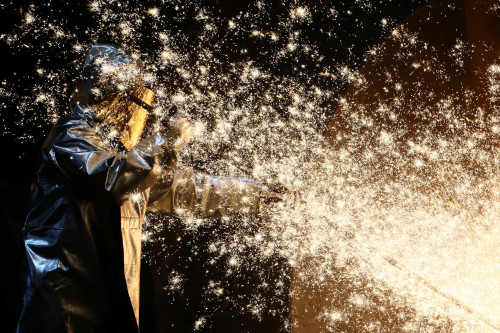By Jeff Mason
ABOARD AIR FORCE ONE/SEOUL/FRANKFURT (Reuters) – President Donald Trump is expected to introduce new 25% tariffs on Monday on all steel and aluminium imports into the U.S., on top of existing metals duties, in another major escalation of his shake-up of trade policy.
As the risk mounts of a multi-front trade war, the European Union flagged it may retaliate and Trump promised further announcements on Tuesday or Wednesday of broader reciprocal tariffs to match those of countries importing U.S. goods.
Shares in U.S. steel and aluminium makers jumped. Nucor and U.S. Steel rose between 4% and 7% in morning trade, while Cleveland-Cliffs shares jumped 15%. Century Aluminum added 13% and Alcoa 4%.
Shares in European and Asian steelmakers fell.
Speaking to reporters on Air Force One on his way to Sunday’s NFL Super Bowl in New Orleans, Trump said he would announce the metals tariffs on Monday and the reciprocal tariffs soon afterwards, adding “if they charge us, we charge them.”
The largest sources of U.S. steel imports are Brazil, Canada and Mexico, followed by South Korea and Vietnam, according to government and American Iron and Steel Institute data.
Meanwhile, Canada, whose extensive hydropower resources aid its metal production, accounted for 79% of U.S. primary aluminium imports in the first 11 months of 2024.
During his first four-year term from 2017, Trump imposed tariffs of 25% on steel and 10% on aluminium.
But he later granted several countries exemptions, including Australia, Brazil, Canada and Mexico, and his successor Joe Biden later negotiated duty-free quota deals with Britain, Japan and the EU.
With more demands for exemption and negotiation in prospect, some said Trump’s action would first of all damage the U.S. economy by raising the cost of the raw materials it depends on.
“Canadian steel and aluminum support key industries in the U.S. from defence, shipbuilding and auto,” Canadian Innovation Minister Francois-Philippe Champagne posted on X.
“We will continue to stand up for Canada, our workers, and our industries.”
Australia, also a strategic U.S. ally, has been making representations on aluminium and steel for months.
“Australian steel and aluminium are creating thousands of good paying American jobs, and are key for our shared defence interests,” Trade Minister Don Farrell said.
EU AND SOUTH KOREA WEIGH RESPONSES TO TRUMP TARIFFS
In South Korea, the Industry Ministry called in steelmakers to discuss how to minimise the impact of tariffs.
Hyundai Steel shares dipped by as much as 2.9% amid a broader decline among South Korean steelmakers.
European steelmakers account for about 15% of imports into the United States, and shares in ArcelorMittal, and Voestalpine slipped between 1.3% and 2.5%. Germany’s Thyssenkrupp and Salzgitter were little changed.
The European Commission said it saw no justification for the imposition of tariffs: “We will react to protect the interests of European businesses, workers and consumers.”
It said Commission President Ursula von der Leyen would meet U.S. Vice President JD Vance in Paris on Tuesday during an AI summit. The German government said it was “working towards ensuring that these measures (tariff increases) do not materialise”./
Trump also said that, while the U.S. government would allow Japan’s Nippon Steel to invest in U.S. Steel, it would not allow a majority stake.
“Tariffs are going to make (U.S. Steel) very successful again,” Trump said.
Nippon Steel declined to comment, but Japan’s Chief Cabinet Secretary Yoshimasa Hayashi said the company was considering a bold change in plan.
U.S. steel mill capacity usage jumped above 80% in 2019 after Trump’s initial tariffs, but has since fallen as China’s global dominance – unaffected by its exclusion by tariffs from the U.S. market – has pushed down prices.
A Missouri aluminium smelter revived by the previous tariffs was idled last year by Magnitude 7 Metals.
Kevin Dempsey, head of the American Iron and Steel Institute, said it would work with Trump “to implement a robust and reinvigorated trade agenda to address the many foreign market-distorting policies and practices that create an unlevel playing field for American steelmakers.”
TRUMP PROMISES RECIPROCAL TARIFF ANNOUNCEMENT SHORTLY
Trump also promised detailed information on Tuesday or Wednesday on his reciprocal tariff plan.
The president has long complained about the EU’s 10% tariff on auto imports, much higher than the U.S. car rate of 2.5%.
However the U.S. applies a 25% tariff on pickup trucks, a vital source of profit for Detroit automakers General Motors, Ford and Stellantis’ U.S. operations.
Overall, the U.S. trade-weighted average tariff rate is about 2.2%, according to World Trade Organization data, compared to 12% for India, 6.7% for Brazil, 5.1% for Vietnam and 2.7% for the EU.
Chris Swonger, CEO of the Distilled Spirits Council of the United States, said Trump’s new steel tariffs could lead to the EU imposing retaliatory duties on American whiskey.
“We are urging that the U.S. and EU move swiftly to find a resolution. Our great American whiskey industry is at stake. A 50% tariff on America’s native spirit will have a catastrophic outcome for the 3,000 small distilleries across the United States,” he said.
Trump had already threatened to impose tariffs of 25% on all imports from America’s two largest trading partners, Canada and Mexico, saying they must do more to halt the flow of drugs and migrants across the U.S. border.
After some border security concessions, Trump paused the tariffs until March 1. But he told Fox News that more measures were needed.
“Something has to happen, it’s not sustainable,” he said, “and I’m changing it.”
(Reporting by Jeff Mason and David Lawder; Writing by David Lawder and Kevin Liffey; Additional reporting by Lidia Kelly in Melbourne, David Ljunggren and Costas Pitas; Editing by Barbara Lewis, Sharon Singleton and Nick Zieminski)



